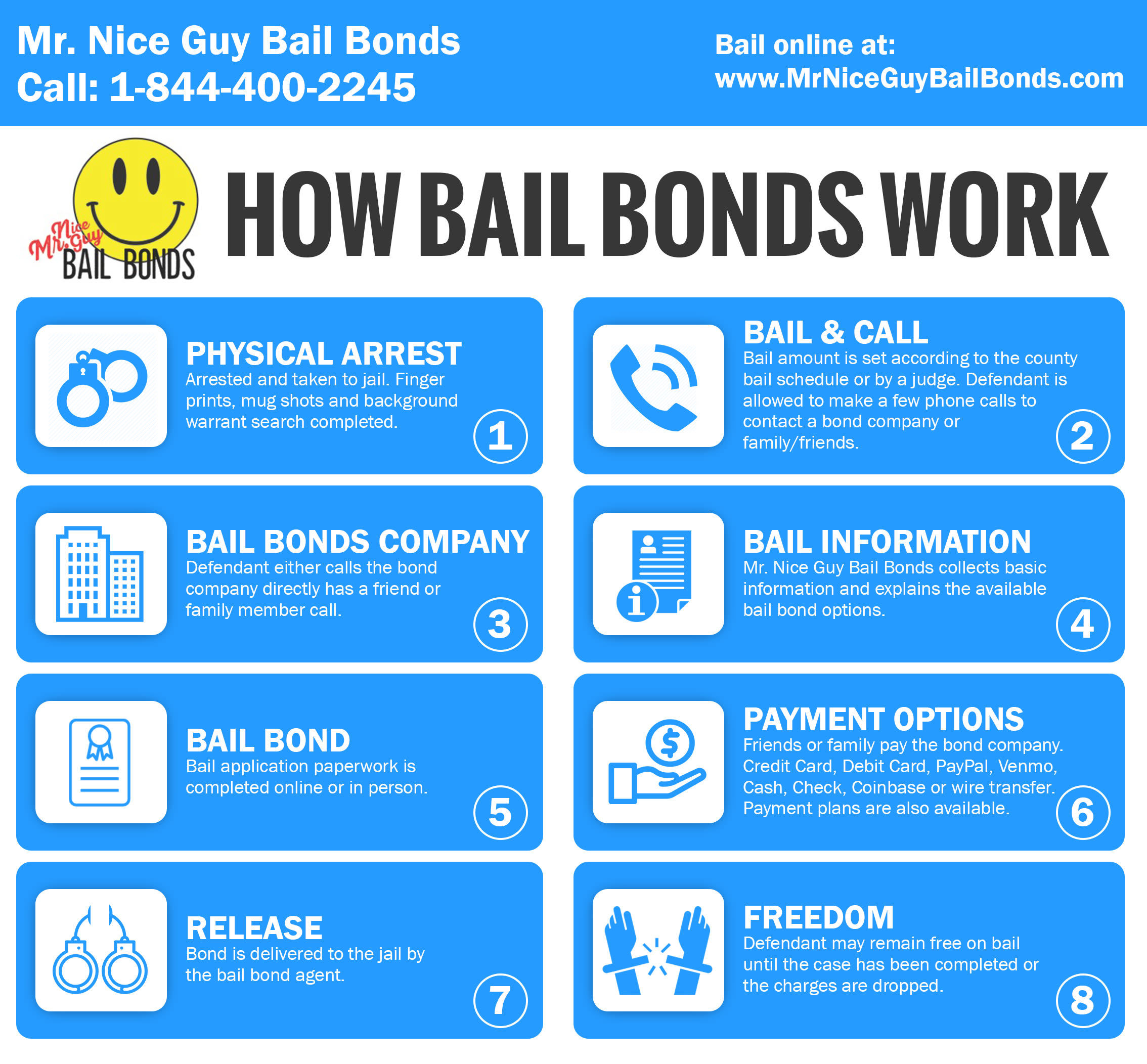Dayton Bail Bonds Services - Expert and Confidential
Dayton Bail Bonds Services - Expert and Confidential
Blog Article
Opening the Tricks of Bail Bonds: A Comprehensive Summary
Browsing the complex world of Bail bonds can frequently feel like decoding a puzzling code, with layers of complexity that remain hidden to several. From the numerous kinds of Bail bonds offered to the critical role of a co-signer, each element plays an essential component in this legal procedure. As we unravel the web of details surrounding Bail bonds, a more clear understanding arises, clarifying the devices that underpin this system. Join us as we dive deeper into the nuanced facets of Bail bonds, uncovering the keys that lie within and debunking this typically nontransparent world.
Comprehending Bail Bonds Process
When facing a legal circumstance that calls for posting Bail, comprehending the Bail bonds process is vital to browse the complexities of the judicial system effectively. Bail bonds serve as an economic guarantee to the court that the accused will certainly stand for all needed court appearances. This process includes a bondsman, that typically charges a non-refundable charge, generally around 10% of the complete Bail amount, to publish the Bail in behalf of the accused.

Furthermore, collateral, such as residential or commercial property or possessions, may be required to safeguard the bail bond. Recognizing the terms of the bail bond contract is necessary to make sure compliance and avoid any added lawful repercussions. By comprehending the Bail bonds procedure, individuals can make informed choices when browsing the lawful system.
Kinds of Bail Bonds Available
Different kinds of Bail bonds are readily available to individuals dealing with legal procedures, using options customized to certain situations and demands. The most common type is a surety bond, where a bond bondsman pays the complete Bail quantity in support of the offender in exchange for a non-refundable cost, generally around 10% of the complete Bail. Money bonds require the complete Bail amount to be paid in cash money before the offender can be released. Home bonds, on the other hand, include using valuable properties like property as security for the Bail amount.
Furthermore, there are government Bail bonds for cases including government charges and migration bonds for individuals restrained by Immigration and Traditions Enforcement (ICE) Understanding the various kinds of Bail bonds available can assist offenders navigate the legal process extra effectively.
Duties of the Co-Signer

Furthermore, as a co-signer, you are accountable for guaranteeing that the defendant complies with any problems set by the court, such as going to counseling or avoiding from particular activities. It is crucial to maintain open interaction with the offender to monitor their compliance and resolve any problems without delay. Inevitably, being a co-signer entails a significant level of count on and obligation, as you are economically and legitimately tied to the accused's Bail obligations.
Repercussions of Missing Bail

Avoiding Bail can have severe lawful consequences for both the co-signer and the offender entailed in the bail bond agreement. When a defendant fails to appear in court as called for after posting Bail, the court typically provides a warrant for their arrest. This bail bonds dayton ohio not just aggravates the defendant's legal problems yet additionally places the co-signer in danger.
For the accused, skipping Bail can cause extra criminal charges, such as ridicule of court or Bail leaping, which can lead to penalties, a retraction of Bail opportunities, or perhaps jail time. Moreover, the accused might lose the Bail quantity paid and any kind of collateral given.
If the offender avoids Bail,Co-signers additionally deal with significant effects. As the co-signer ensures the defendant's look in court and is economically responsible for the complete Bail quantity, they may be needed to pay the entire Bail if the offender absconds. This can result in economic pressure, harmed credit report, and potential lawsuit against the co-signer.
Secret Consider Bail Bond Approval
Extra major offenses might lead to greater Bail amounts or even a denial of Bail entirely. A background of previous sentences or a pattern of avoiding court days can increase red flags and make it harder to secure a bail bond.
In addition, the connections the offender has to the community can impact the approval of a bail bond. The ability to pay the Bail amount or offer security can boost the opportunities of bail bond authorization. Inevitably, a mix of these elements is considered by the court when identifying whether to authorize a bail bond.
Verdict
In conclusion, recognizing the Bail bonds procedure, the kinds offered, the obligations of the co-signer, the repercussions of avoiding Bail, and the vital factors in bail bond approval are vital for browsing the lawful system. By acquainting oneself with these facets, individuals can make educated decisions and ensure a smoother procedure when taking care of Bail bonds. It is crucial to comply with the standards and requirements stated to stay clear of any kind of potential complications.
The most common type is a surety bond, where a bond bondsman pays the full Bail amount on behalf of the defendant in exchange for a non-refundable charge, typically around 10% of the total Bail. By authorizing the bail bond contract, you are taking on the duty of ensuring the full Bail amount if the defendant falls short to show up in court - bail dayton ohio.Skipping Bail can have significant legal consequences for both the co-signer and the defendant entailed in the bail bond agreement. The ability to pay the Bail amount or give collateral can increase the opportunities of bail bond approval.In verdict, recognizing the Bail bonds process, the types readily available, the obligations of the co-signer, the consequences of avoiding Bail, and the crucial variables in bail bond authorization are critical for browsing the legal system
Report this page